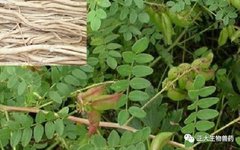
Astragalus (Huang Qi) is the dried root of the leguminous plant Mongolian Astragalus or Membranous Atractylodes. It has a sweet and warm nature and is one of the most commonly used medicinal materials, first recorded in the Shen Nong Ben Cao Jing. Its effects include tonifying Qi and stabilizing the exterior, promoting urination and reducing swelling, and expelling toxins and promoting tissue regeneration. It is widely used in clinical medicine and animal husbandry, earning the nickname “Ten Medicines, Eight Astragalus”.
Statistics show that there are over 200 types of Chinese patent medicines made from Astragalus and more than 160 health products on the market that use Astragalus as a raw material. Long-term application has demonstrated that Astragalus, as a typical Qi-tonifying herb, has indeed shown clinical efficacy, and its therapeutic and nourishing effects have been widely recognized.

Effects:
1. Tonifying Qi and stabilizing the exterior, promoting urination and detoxification, expelling pus, and promoting tissue regeneration. It is used for symptoms of Qi deficiency such as fatigue, poor appetite, loose stools, prolapse of the middle Qi, chronic diarrhea, rectal prolapse, blood in stools, and excessive sweating due to exterior deficiency. It is also effective for conditions like Qi deficiency edema, difficult-to-heal abscesses, chronic ulcers, blood deficiency, internal heat leading to thirst, chronic nephritis, proteinuria, and diabetes. In animal husbandry, it has been validated over many years to significantly enhance the stress resistance of livestock and poultry.

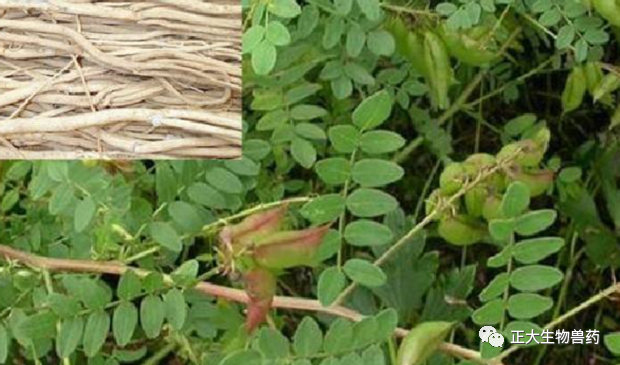
2. It enhances the body’s immune function, protects the liver, promotes urination, has anti-aging and anti-stress effects, lowers blood pressure, and exhibits broad-spectrum antibacterial properties. It can eliminate experimental nephritis proteinuria, enhance myocardial contractility, and regulate blood sugar levels. It is used for Qi deficiency symptoms such as fatigue, poor appetite, prolapse of the middle Qi, chronic diarrhea, rectal prolapse, blood in stools, excessive sweating due to exterior deficiency, Qi deficiency edema, and difficult-to-heal abscesses. It is particularly effective for sows with postpartum weakness and hens with rectal prolapse and decreased production performance when combined with herbs like Yi Mu Cao (Motherwort) and Dang Gui (Angelica).
3. It enhances the body’s tolerance to hypoxia and stress, promotes metabolism, and improves heart function; it has a blood pressure-lowering effect and can be used as an adjunctive treatment for diabetes. Astragalus also has antibacterial and antiviral properties, and when combined with Astragalus during outbreaks of high-risk diseases in livestock and poultry, it can strengthen the heart and improve the cure rate by over 50%.

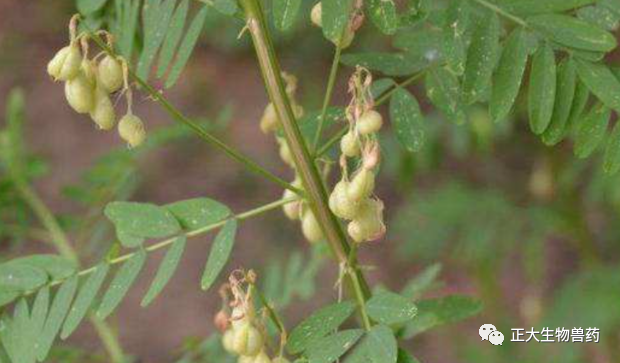

Before discussing this issue, two points must be clarified:
1. Astragalus and Astragalus polysaccharides are not the same concept. Astragalus is a traditional Chinese medicine with properties of cold, heat, warmth, coolness, and the ability to ascend and descend, while Astragalus polysaccharides have completely different characteristics, resembling Western medicine, and the properties of traditional Chinese medicine have disappeared.
2. The “cold damage” mentioned in the text refers to the invasion of the six excesses in traditional Chinese medicine, not the Western medical concept of typhoid fever.
In veterinary clinical practice, Astragalus is often used. It is a premier Qi-tonifying herb, primarily effective for tonifying Qi and stabilizing the exterior, promoting urination and detoxification, and can be used for conditions like prolapse of the middle Qi and excessive sweating due to exterior deficiency.
In clinical use, there is a distinction between raw and roasted Astragalus, namely Sheng Huang Qi (Raw Astragalus) and Zhi Huang Qi (Roasted Astragalus). Raw Astragalus can benefit the Wei (defensive Qi) and stabilize the exterior, promote urination and reduce swelling, and treat spontaneous sweating and night sweating; roasted Astragalus primarily tonifies the middle and benefits Qi. Additionally, the dosage in clinical practice varies; for raw Astragalus, a small amount (under 15 grams) can benefit lung water, while a larger amount has the effect of raising Yang.
It can be seen that while Astragalus can tonify the Qi of the spleen and lungs, its primary function is to support the lung Wei, as its nature is to ascend and uplift, making it particularly effective for symptoms of lung Qi deficiency.

Applications of Astragalus in Poultry Farming
Astragalus has diuretic, detoxifying, and anti-swelling effects, making it particularly suitable for treating chicken diseases associated with “Qi damage” or requiring diuretics. If chickens experience diarrhea, it may indicate severe gastrointestinal damage; in such cases, Astragalus can “tonify Qi” to help resolve the diarrhea. It can also be used to supplement Qi and water for respiratory diseases caused by insufficient lung Qi. The specific effects are as follows:

1. Tonifying Qi and nourishing Yang
Astragalus is warm in nature, sweet in taste, and enters the lung and spleen meridians, making it an important tonic herb. When the chicken flock shows decreased feed intake, lethargy, or laying hens experience rectal prolapse, pecking, or death from egg binding, feeding Astragalus to the chickens can yield excellent therapeutic effects.

2. Reducing swelling due to damp-heat
Astragalus benefits Qi and strengthens the spleen, commonly used to treat edema caused by Qi deficiency and spleen deficiency with damp stagnation. In summer, when the chicken coop is hot and humid, and the flock shows signs of Qi deficiency edema, feeding Astragalus can promote food intake and aid digestion and absorption.

3. Reducing suppurative lesions
When chickens are infected with staphylococcus or fowl pox, lesions may appear on the eyelids, corners of the mouth, and chicken feet, as well as on the wings and cloaca, presenting as acne rashes or purplish skin with subcutaneous moisture and congestion. At this time, Astragalus can alleviate suppurative lesions and aid in the recovery of ulcerated surfaces.

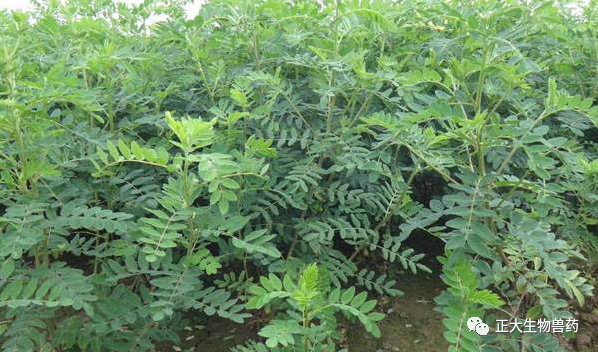

4. Antibacterial and bactericidal effects
Astragalus contains components such as Astragalus polysaccharides, astragaloside, and folic acid, which have good inhibitory effects on Staphylococcus aureus, hemolytic streptococcus, pneumococcus, and Shigella. If chickens are bitten by insects or scratched in the coop, they are prone to infection with Staphylococcus aureus. In such cases, feeding Astragalus to sick chickens can effectively kill the bacteria.

5. Enhancing chicken immunity
Astragalus contains Astragalus polysaccharides, which can improve the disease resistance of chickens and reduce adverse stress. Therefore, when chickens are subjected to stress from flock transfer, feed changes, or vaccination, feeding Astragalus can enhance their disease resistance and prevent illness. Additionally, during vaccination periods, feeding Astragalus can also enhance immune effects and improve the protective capacity of antibodies.

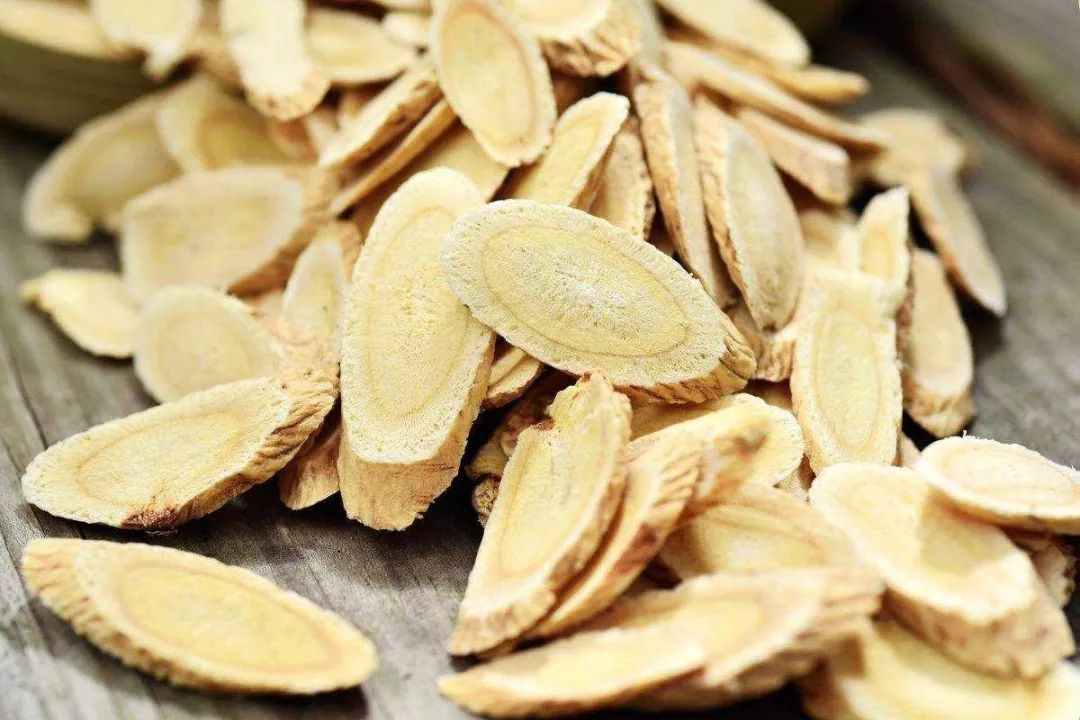
The applications of Astragalus are not limited to the above; many classical formulas passed down through the ages also feature it, such as Buzhong Yiqi Decoction, which uses Astragalus to uplift sinking Qi; and Yupingfeng San, which uses Astragalus as the monarch herb to tonify the Wei and consolidate Yin, treating excessive sweating due to exterior deficiency.
However, like all things, there are contradictions. While Astragalus is widely used, there are also situations where it is not suitable. For instance, medical texts clearly state that it should be avoided in cases of excess conditions and Yin deficiency with Yang excess. Yao Xue Ru Men also mentions that it should not be used in cases of dark and strong Qi or when exterior pathogens are strong, and it should be used sparingly in cases of Yin deficiency.
Ben Cao Jing Shu also states that it should not be used in cases of gastrointestinal stagnation, Yang excess with Yin deficiency, or when there is excessive heat in the upper burner and cold deficiency in the lower burner, and it should not be used in cases of liver Qi stagnation, etc. From these medical texts, it is clear that Astragalus should not be used in cases of excess conditions and Yin deficiency. Yin deficiency can be understood because Astragalus is a purely Yang herb, and excessive Yang can injure Yin, hence it should not be used.
So what is an excess condition? Excess conditions can be divided into cold and heat, namely excess cold syndrome and excess heat syndrome. Generally speaking, in cases of excess conditions, it is often a new illness where the righteous Qi is not deficient, as the saying goes, “excess is the evil Qi being strong, and deficiency is the righteous Qi being weak”.

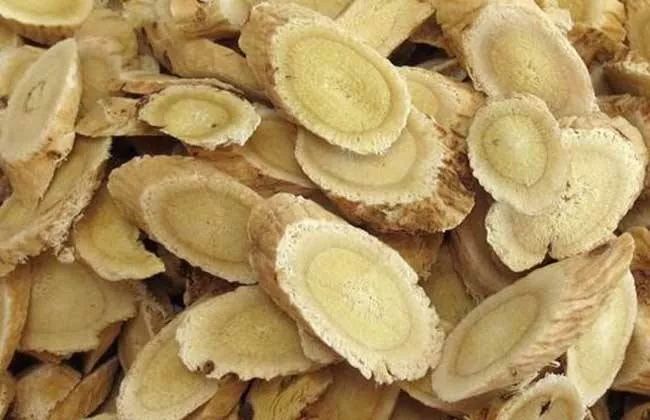
Let us further illustrate this issue with the example of excess conditions due to cold damage. Excess cold refers to a strong evil Qi, where the righteous Qi is not deficient, and the evil and righteous Qi are obstructed at the body surface, presenting a type of syndrome where the problem is the evil Qi being strong rather than the righteous Qi being deficient.
In this case, it is necessary to use a type of pungent dispersing herb to help the body expel the pathogenic evil, rather than tonifying, as tonifying would retain the evil. Moreover, since Astragalus has a sweating-consolidating effect, it should not be used. What does “consolidate” mean? It means to gather and restrain.
When cold evil is present on the surface, pungent dispersing herbs are needed to drive the evil out. However, if a consolidating herb is added, it will pull the direction of action inward, which will affect the expulsion of the evil. Therefore, this is also the reason why Astragalus is contraindicated in such syndromes.
Thus, while Astragalus is beneficial, it must be used appropriately, distinguishing between deficiency and excess, and understanding the ascending and descending properties of the herb to achieve the desired therapeutic effect.

